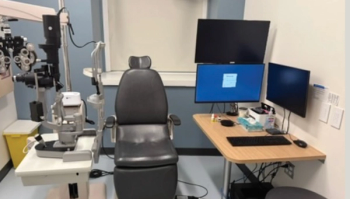
Should we perform refractive surgery in the glaucoma patient? YES
There is no evidence to suggest that there is rapid glaucoma progression following refractive surgery.
Key Points
To begin with, I would first like to make a distinction between early-stage glaucoma (with or without minimal optic nerve damage and with good medical control) and late-stage or advanced glaucoma (with glaucomatous optic nerve damage, requiring glaucoma surgery).
Why should early-stage glaucoma patients miss out?
I would not treat early-stage glaucoma patients any differently than I would treat non-glaucoma patients when assessing their eligibility for corneal refractive surgery. It's true that Goldmann applanation tonometry is misleadingly low after corneal refractive surgery. It was Hans Goldmann himself who clearly stated that his device gave the most accurate intraocular measurements in 520 μm thick corneas with normal K readings. The change in corneal thickness after corneal refractive surgery clearly influences the readings. Fortunately, however, we now have excellent alternative eye pressure measurement devices that are not influenced by corneal thickness; for example, Reichert's Ocular Response Analyser (ORA) or Ziemer's Pascal Dynamic Contour Tonometer (DCT). Both devices have been studied extensively in patients before and after corneal refractive surgery and compared against Goldmann applanation, which was the previous gold standard.
Additional precautions should be taken
Understandably, we must take additional precautions in these patients preoperatively; a full glaucoma assessment must be performed at baseline. Tests would include: automated visual field, optic disc cupping registration (GDx, HRT, OCT, non-mydriatic photography), baseline intraocular pressure (IOP) (ORA, DCT), and all other tests that would normally be performed in the diagnosis and assessment of the glaucoma suspect or patient. IOP must be monitored very carefully and the refractive surgeon must be aware of the corticoid responder; particular caution must be applied in these patients.
Surgeons should also counsel their patients before surgery to inform them of the rigorous follow-up schedule, which will differ from that of routine LASIK patients. Surgeons must also explain that glaucoma and refractive surgery are separate entities. The patient must understand that glaucoma is a progressive disease, which may, at times require additional surgery, such as filtration surgery and phacoemulsification.
Overall, I would say that if all of the necessary preoperative and postoperative assessments are performed, a surgeon should not expect a greater incidence of intraoperative or postoperative complications in the glaucoma suspect or the early-stage glaucoma patient following corneal refractive surgery. So why should these patients not take advantage of this surgery? There is no evidence to suggest that there is rapid glaucoma progression following refractive surgery so we shouldn't deny this patient set the opportunity to enhance their quality of life.
Advanced glaucoma patients: that's a different story
When considering the second group of patients, the late-stage glaucoma patients, I admit that I would be very hesitant before performing LASIK on glaucoma sufferers who have optic nerve damage. The high pressure that is induced during the corneal flap cutting procedure (irrespective of whether this is done with a mechanical microkeratome or with a femtosecond laser) could possibly create further optic nerve damage. LASEK could be the option to consider in these cases but there is a case for not performing corneal refractive surgery at all in late-stage glaucoma patients.
First of all, I think it is difficult for glaucoma patients to distinguish between glaucoma disease progression and the accompanying progressive visual loss, from the results of a refractive surgery procedure. Advanced glaucoma patients would naturally expect to have better vision in the long-term after undergoing vision correction surgery; after all, they paid for it and their ophthalmologist had recommended the procedure. However, it might not be possible to gain this result in those glaucoma patients who are also suffering progressive visual field loss from the disease. This will of course lead to disappointment.
Secondly, if a glaucoma patient requires filtration surgery for their condition, one should not disregard the fact that they might also soon require cataract surgery. If a glaucoma patient has already undergone corneal refractive surgery, it is more difficult for a cataract surgeon to obtain emmetropia in that patient, in spite of the IOL calculation used, no matter how advanced that might be. With the advent of small incision phacoemulsification surgery, cataract surgeons can also now correct patients' refractive errors with the arsenal of aspheric and toric IOLs currently available. By that rationale, I would recommend that late-stage glaucoma patients wait until cataract surgery is required, instead of opting for refractive surgery.
My overall strategy
In summary, I would say "yes", corneal refractive surgery can be performed in the glaucoma suspect and the glaucoma patient whose disease is medically controlled, so long as extensive preoperative evaluations are carried out. With regards to the end-stage glaucoma patient, who is likely to also require glaucoma surgery in the short-term, I would say "no", corneal refractive surgery should not be performed in this group of patients.
---
To read the counter-argument put forward by Dr Nikoloas Mavrakanas and Dr Tarek Shaarawy, please go to
Newsletter
Get the essential updates shaping the future of pharma manufacturing and compliance—subscribe today to Pharmaceutical Technology and never miss a breakthrough.




























